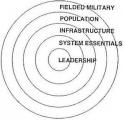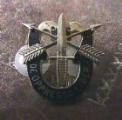pp.31-32
THE TRINITY
This chapter has described the nature of the strategic environment. This environment is defined by the nature of politics and the interactions of political entities that participate in the political process. The strategic environment is complex and subject to the interplay of dynamic and often contradictory factors. Some elements of politics and policy are rational, that is, the product of conscious thought and intent. Other aspects are governed by forces that defy rational explanation. We can discern certain factors that are at work in any strategic situation-the constants and norms-and use them as a framework to help understand what is occurring. At the same time, we realize that each strategic situation is unique and that in order to grasp its true nature, we must comprehend how the character and motivations of each of the antagonists will interact in these specific circumstances.
Summarizing the environment within which war and strategy are made, Clausewitz described it as being dominated by a “remarkable trinity” that is-
composed of primordial violence, hatred, and enmity, which are to be regarded as a blind natural force; of the play of chance and probability within which the creative spirit is free to roam; and of [war’s] element of subordination, as an instrument of policy, which makes it subject to reason alone.
The first of these three aspects mainly concerns the people; the second the commander and his army; the third the government.
These three tendencies are like three different codes of law, deep-rooted in their subject and yet variable in their relationship to one another. A theory that ignores any one of them or seeks to fix an arbitrary relationship between them would conflict with reality to such an extent that for this reason alone it would be totally useless.
Our task therefore is to develop a theory that maintains a balance between these three tendencies, like an object suspended between three magnets.[17]
Clausewitz concluded that the strategic environment is shaped by the disparate forces of emotion, chance, and rational thought. At any given moment, one of these forces may dominate, but the other two are always at work. The actual course of events is determined by the dynamic interplay among them. The effective strategist must master the meaning and the peculiarities of this environment.[18]
17. Clausewitz, p. 89. > 3. Carl von Clausewitz, On War, trans. and ed. Michael Howard and Peter Paret (Princeton, NJ: Princeton University Press, 1976).
18. See Edward J. Villacres and Christopher Bassford, “Reclaiming the Clausewitzian Trinity,” Parameters (Autumn 1995) pp. 9-19.




 ) ) implementing strategy. No quarrel with that. I'll also point out that, per your comment yesterday, the document contained no resource considerations...
) ) implementing strategy. No quarrel with that. I'll also point out that, per your comment yesterday, the document contained no resource considerations...



 ) Agree about Louis Johnson. But, in the 1948 - 50 period there was no NSC staff to speak of and the concept was that State was the lead agency. The PPS was an innovation of SECSTATE George C. Marshall that, IMO, he created to replicate a planning component of a military staff. Today, that is the J5 staff section at the JS and all GCCs. And the PPS has significantly atrophied.
) Agree about Louis Johnson. But, in the 1948 - 50 period there was no NSC staff to speak of and the concept was that State was the lead agency. The PPS was an innovation of SECSTATE George C. Marshall that, IMO, he created to replicate a planning component of a military staff. Today, that is the J5 staff section at the JS and all GCCs. And the PPS has significantly atrophied.





Bookmarks